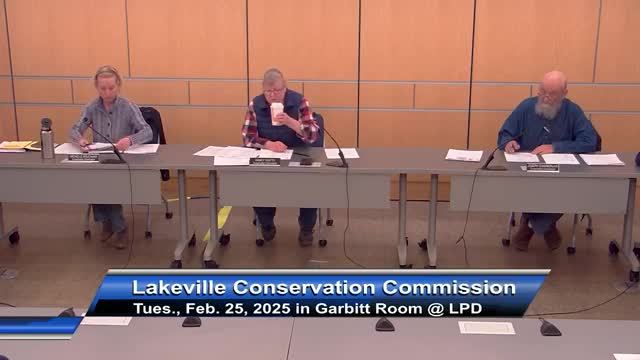Conservation commission delays 160 Bedford Street stormwater plan pending independent peer review
Get AI-powered insights, summaries, and transcripts
Subscribe
Summary
The Lakeville Conservation Commission continued review of a proposed detention basin and filtration system at 160 Bedford Street to its March 25 meeting while it arranges an independent peer review and clarifies filter maintenance and disposal procedures.
The Lakeville Conservation Commission on Feb. 25 continued review of a stormwater plan for 160 Bedford Street and directed staff to secure an independent peer reviewer before taking further action.
The applicant, Rick Treon of Prime Engineering, described a proposed detention basin and a two-stage “pig” filter (filter socks) designed to remove heavy metals from runoff before it reaches an off-site wetland. Treon said the project ‘‘proposing a really sizable detention basin’’ and that, with the filtration, ‘‘this will be effective in removing the majority of metals.’’ The commission voted to continue the item to the March 25, 2025 meeting at 6:30 p.m. at the police station so it can select a peer reviewer and obtain a scope and cost estimate.
Why it matters: The proposed detention and treatment system sits uphill of a wetland that the commission determined is connected to downstream resources. Commissioners said they want an independent technical review of hydraulic calculations, pollutant removal claims, and the proposed operation and maintenance procedures before approving work that could affect wetlands and neighbors.
Details of the proposal and commission concerns Rick Treon said the detention basin will route flow through a small orifice and then through two filter socks in series that are intended to absorb metals. He explained how he plans to install concrete blocks above and below the sock to facilitate replacement: ‘‘it’s easy enough to lift the patio blocks off, replace the the filter sock, and then put the patio block back on,’’ Treon said. He also told the panel that filter replacement was expected annually and that the design leaves ‘‘plenty of hydraulic capacity.’’
Commission members asked whether the filter under patio blocks would still function as designed and whether manufacturers had been consulted. Treon acknowledged compression would reduce hydraulic capacity but said the longer sock length compensates for that. Commissioners also pressed for procedures and documentation for disposal of used filter media; Treon said used media would be sampled and disposed of according to lab results and applicable disposal rules and that heavily contaminated media could be sent to lined landfill or other licensed facilities.
Peer review and next steps Conservation Agent Mark Minton summarized the commission’s attempt to line up peer reviewers: several firms were contacted (Ecosolutions, John Rockwell’s firm, others), but conflicts or staffing gaps prevented selection. He said the commission will continue the application so staff can identify and secure a reviewer closer to Lakeville, obtain a quote, and collect peer-review funds from the applicant. The commission’s chair moved to continue the item to March 25, 2025; the motion passed.
The commission also requested the applicant provide clear chain-of-custody and disposal procedures for used filter media and that the peer reviewer specifically evaluate hydraulic computations and the proposed treatment’s effectiveness.
Ending At the March 25 meeting the panel expects to review peer-review proposals and a recommended reviewer, along with any revised plans or clarifications on maintenance and disposal procedures.
